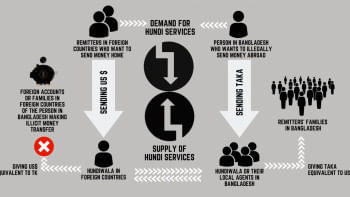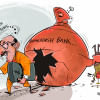Why remitters still prefer hundi

Despite an increasing number of Bangladeshis leaving for jobs abroad, the remittance inflow is decreasing at an alarming rate. In September 2023, migrant workers sent home $1.34 billion—the lowest since April 2020, according to data from Bangladesh Bank. So, why have we failed to translate a record worker outflow into an increase in remittance inflow?
Some analysts opine that the reason for lower remittances is the widening gap between official and unofficial exchange rates. Currently, banks are offering Tk 109.5 per dollar for remittance, whereas the rate on the informal market is around Tk 117-119 per dollar. Many argue that institutional barriers such as high transaction costs and formalities for sending remittances through formal channels hinder remitters' use of bank services. Some say there are many Bangladeshis living abroad illegally who do not comply with the legal requirements to send money home and, as such, hundi is the only way for them to make transactions.
However, I think there is more to the story. Why does the hundi system persist? How does it work? And what benefits does the hundi cartel abroad reap by collecting the US dollar at a higher exchange rate?
According to the Washington, DC-based think tank Global Financial Integrity (GFI), Bangladesh lost $8.27 billion every year on average, between 2009 and 2018, due to mis-invoicing by traders of the value of imported and exported goods.
We know that corrupt politicians, dishonest government officials, or politically-blessed businessmen—who have amassed wealth through various forms of corruption and illicit deals in drug trafficking, extortion, bribes, commissions, and kickbacks from foreign aid and loans—siphon off money from Bangladesh to the Middle East, Thailand, Malaysia, Singapore, the US, or Canada. In these countries, these corrupt individuals either keep the money in banks or use it to invest in real estate. How do they take so much money out of Bangladesh? This is where the hundi cartels come into the picture.
Let's say Mr X would like to shift his $100,000 of ill-gotten money to Dubai. So, he contacts a local agent of the hundi cartel in Bangladesh, gives them details of his Dubai-based bank account, and pays the money in local currency—say, at a rate of Tk 119 per dollar. Then, hundi representatives somewhere in the Middle East transfer $100,000 to Mr X's Dubai account. To get back this amount in US dollars, hundi representatives in the Middle East collect the dollars from several Bangladeshi migrant workers, paying them, say, Tk 116 per dollar. So, the dollars taken are used for the payment to Dubai, and the taka received from Mr X by a local agent of the hundi cartel is used to pay relatives of migrant workers in Bangladesh. As is evident, no money crosses Bangladesh's borders, and the remittance that was supposed to come in does not pass through the formal channel. Thus, the expected amount of US dollars is not flowing into the country; instead, it is remaining in a foreign country, while the relatives of migrant workers get their money in the local currency.
In addition, unscrupulous importers who undervalue consignments to evade customs duties and other taxes are big buyers of US dollars in the informal market. To dodge such taxes, the importers state prices of goods on import documents to be less than the prices actually paid, and then settle the under-invoiced portion with exporters using the hundi system. To note, because of under-invoicing by these businesses, the country is losing both import revenue and remittances.
According to the Washington, DC-based think tank Global Financial Integrity (GFI), Bangladesh lost $8.27 billion every year on average, between 2009 and 2018, due to mis-invoicing by traders of the value of imported and exported goods. The average loss of customs and taxes was 17.3 percent of Bangladesh's trade with all its trading partners during those years.
For a Bangladeshi citizen, outward remittances are generally restricted by Bangladesh Bank. Non-Resident Bangladeshis (NRBs) therefore encounter difficulties in moving inheritance money from Bangladesh to their country of residence. Likewise, people permanently moving away from Bangladesh and settling abroad who want to sell off their house, land, or other immovable property face difficulties in repatriating proceeds from the sale. So, what do they do with the money? They, too, must take that money abroad through hundi. Similarly, Bangladeshis seeking healthcare services in foreign countries, going for tourism, studying abroad use services of the hundi cartel when their expenses exceed their foreign exchange quota.
Clearly, the hundi system persists because there is a strong demand from Bangladeshis for the greenback that cannot be met following the country's foreign exchange regulations. So, in order to meet this demand, hundi service providers collect US dollars at higher rates from the remitters. Economics 101 tells us that if there is a demand for a product, it will be supplied, and that if demand exceeds supply, prices will rise. Therefore, policymakers need to understand that, unless they are able to reduce the demand for the greenback in the informal market, currency devaluation or "offering cash incentives" to remitters will not be enough to direct remittance towards official channels. The hundi cartel will continue to persuade remitters better, even with highly lucrative exchange rates, if required.
The writing is on the wall. At present, Bangladesh is struggling with a protracted dollar crisis and is forced to limit imports as reserves have been falling amid escalated import bills. Remittance inflow has a crucial role in growing foreign exchange reserves. Therefore, to shift remittances from informal to formal channels, urgent policy focus is required to reduce the demand of the US dollar on the informal market. Measures for this end could include making bank transfer easier for migrant workers, lowering import duties, implementing timely and useful reforms in the Foreign Exchange Regulation Act and, most importantly, creating a conducive socio-political environment for all. The government must adopt and fully implement all anti-money laundering recommendations of the Financial Action Task Force, while the laws already in place should be strongly enforced.
Abu Afsarul Haider is an entrepreneur. Reach him at [email protected]
Views expressed in this article are the author's own.
Follow The Daily Star Opinion on Facebook for the latest opinions, commentaries and analyses by experts and professionals. To contribute your article or letter to The Daily Star Opinion, see our guidelines for submission.

 For all latest news, follow The Daily Star's Google News channel.
For all latest news, follow The Daily Star's Google News channel. 











Comments